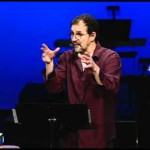We run our website the way we wished the whole internet worked: we provide high quality original content with no ads. We are funded solely by your direct support. Please consider supporting this project.

The Future is Not Like the Past For God (or Us)
Image by seier+seier via Flickr
Everyone agrees that we are not free to change the past. No sane person would claim, for example, that I can now make any free choices about whether John F. Kennedy will be assassinated or not on November 22, 1963. This deed, like all past deeds, has already been accomplished.
Now consider, if God has always foreknown what I will do in the future, then he certainly knew this on November 22, 1963. His knowledge of my future would thus have been among all the facts of reality that God knew on November 22, 1963.
Suppose for the sake of argument that God decided to reveal to us everything he knew to be true on November 22, 1963. Suppose that on this date God sent down a book from heaven containing all of this information entitled God’s Book of Known Facts. Now, if everything you will ever do in the future is listed in this book given on November 22, 1963, and if you are not free in relation to anything in the past, is it not obvious that you could not be free with regard to anything in your future as well? Your whole future is settled in the past—right there in God’s Book of Known Facts.
Suppose you read about your future in this book. Let us suppose that among many other things, you read that you will choose to cheat on your taxes on April 12, 2017. This was written on November 22, 1963. Wouldn’t you now feel the truth that you are no more free to decide your future than you are free to change the past—for you now see your future is past? How could you possibly believe that it was still up to you to resolve whether or not you would cheat on your taxes on April 12, 2017, when you know it is not up to you to resolve any settled fact about November 22, 1963?
Think of it this way. Freedom is the ability to choose between various possibilities. You are free to cheat on your taxes or not only because it is possible for you to cheat on your taxes or not. But if the fact that you will cheat is written in God’s Book of Known Facts, and God can’t possibly be wrong, then it is not possible for you not to cheat on your taxes. Hence you cannot be free to choose between the possibilities of cheating or not cheating. In other words, you can’t be free.
Someone might respond by claiming that God would not reveal such information precisely so that we will remain free. But this response is simply admitting that we only feel free because we are ignorant of the truth. If we are truly free, morally responsible agents, our freedom cannot simply be a feeling based on ignorance. If we are truly free, our ability to determine our future must be rooted in reality. It must really be the case that you could choose to cheat or not cheat on your taxes. And this means that what we will freely do cannot be among the facts recorded in God’s Book of Known Facts on November 22, 1963.
If we are truly free, God’s Book of Known Facts must be open to additions recorded with each free decision we make, just as God “added” fifteen years to Hezekiah’s life in response to his prayer (2 Kings 20:6). If we are truly free—if this is in fact part of the way reality really is—there can be nothing beyond possibilities to be recorded until we choose to act on one of those possibilities. We freely create the fact and then God records it.
If we possess authentic self-determining freedom, then our future must be fundamentally different from our past. The past is unalterable. There are no options for us, which is why we are not free in relation to it. There are not “ifs” or “maybes.” Everything about the past is definitely this way and definitely not any other way. If we are free, however, our future must be different from this. It must in part consist of realities that are possibly this way or possibly that way. Our future must be, at least in part, a realm of possibilities. And the God who knows all of reality just as it is and not otherwise must know it as such. He is not only the God of what will certainly be, he is also the God of possibility.
—adapted from God of the Possible, pages 120-123
Category: General
Tags: Free Will, freedom, Future, God of the Possible, Open Theism, Possibility
Topics: Providence, Predestination and Free Will
Related Reading

Why believe in free will? [Video]
In this video excerpt from his April 29, 2012 sermon tracing the Pietistic influence on Woodland Hills Church, Greg explains why they—along with John Wesley—believe that God does not control everything, but rather gives human beings free will.

Podcast: What is the Difference Between Open Theism and Process Thought?
Greg openly processes the major differences between Open Theism and Process Thought. http://traffic.libsyn.com/askgregboyd/Episode_0218.mp3

What is the significance of 1 Chronicles 21:7–13?
The Lord gives David three options of how Israel may be judged. “Three things I offer you; choose one of them, and I will do it to you.” Paralleling 2 Samuel 24:12–16, this passage reveals that the Lord gives people genuine alternatives and then responds to their choices. If the future is unalterably settled in…

How do you respond to John 6:64, 70–71?
Jesus told his disciples, “‘But among you there are some who do not believe.’ For Jesus knew from the first who were the ones that did not believe, and who was the one that would betray him” (vs. 64). Jesus continued, “‘Did I not choose you, the twelve? Yet one of you is a devil.’…

What is the significance of 2 Chronicles 7:12–14?
The Lord says to Solomon, “When I shut up the heavens so that there is no rain, or command the locust to devour the land, or send pestilence among my people, if my people who are called by my name humble themselves, pray, seek my face, and turn from their wicked ways, then I will…

Did Free Will Evolve? (podcast)
Greg considers how free will emerged from the churning chaos of evolution.. Episode 613 http://traffic.libsyn.com/askgregboyd/Episode_0613.mp3
